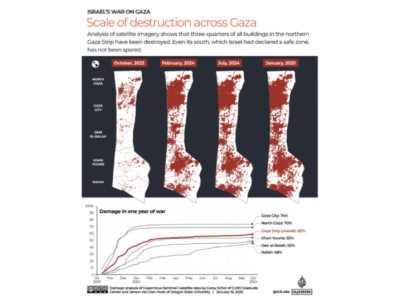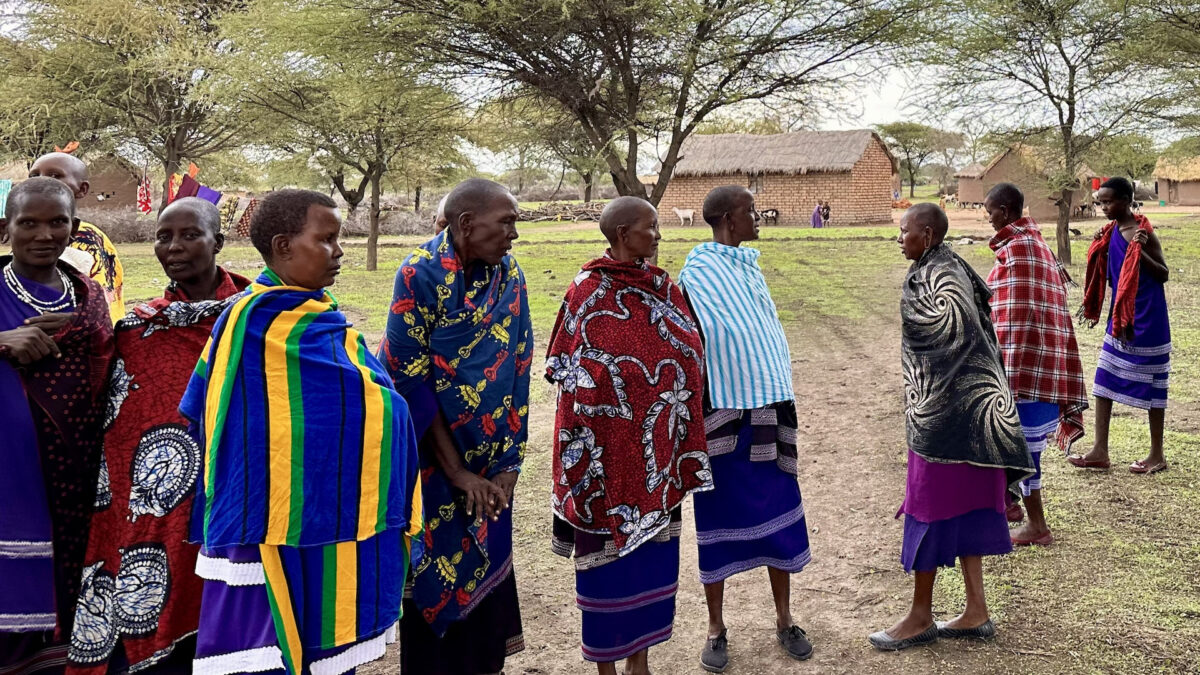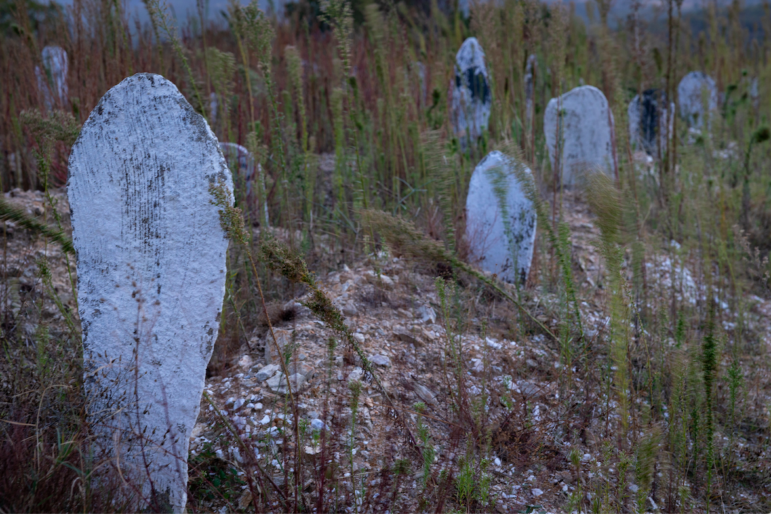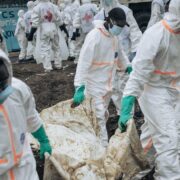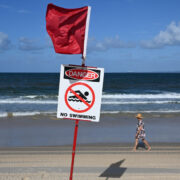
In September 2021, a fire broke out in a temporary health facility for COVID-19 patients in Tetovo, a small city in North Macedonia. The fire spread rapidly, and claimed the lives of 14 people — 12 patients and two visiting relatives.
The government said the hospital had been built to “required standards.” But a team of journalists from North Macedonia’s Investigative Reporting Lab (IRL) — a nonprofit newsroom and GIJN member that reports on crime, corruption, and governance — conducted a seven-month investigation. Working across Skopje and Tetovo and analyzing 5,000 pages of documents shared by two whistleblowers — one from a government institution and one from the judiciary — IRL exposed a shocking government conspiracy and cover-up of problems identified in the tender process, including loopholes for bypassing safety regulations.
“One [whistleblower] had been collecting documents for a year, but was waiting for IRL to get in touch because he didn’t trust other media in Macedonia,” says Sashka Cvetkovska, IRL’s editor-in-chief.
In their investigative documentary into the cause of the fire and its aftermath, IRL identified “corruption, a sabotaged investigation, and a single cable” as the “final culprits” of the accident. Murder in Tetovo explains how, as North Macedonia lacked the infrastructure to handle the COVID-19 pandemic, the health minister oversaw the hasty construction of 19 temporary health facilities, or modular hospitals — using inferior and highly flammable materials. The subsequent conclusions of an official investigation ultimately failed to explain the cause of the fire and why it spread so quickly. With the help of the source documents, which included the findings of a forensic investigation clearly identifying culpability, the IRL team able to reveal that government officials were aware of the substandard construction — and how a forensic investigation into the fire’s causes was “intentionally sabotaged.”
IRL was a 2024 DIG Award finalist for Murder in Tetovo. In 2022, IRL’s Bad Blood investigation — which involved more than 22 months of work and exposed profiteering at one of the country’s most prestigious private hospitals during the COVID-19 pandemic — was a joint winner in Global Shining Light Award (GLSA) small outlets category. The GSLA judges described IRL’s reporting as “dogged and systematic.”
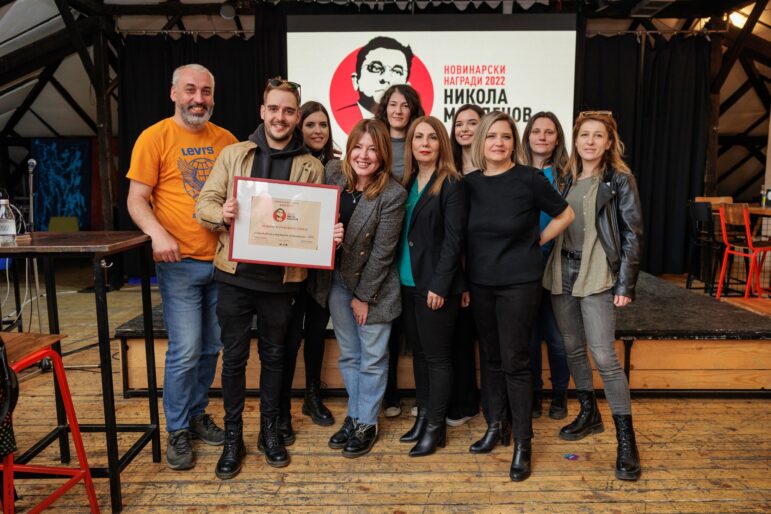
The team of journalists from the Investigative Reporting laboratory celebrating the award for Best Investigative Story at the 2022 Nikola Mladenov Journalism Awards, for the story Dirty Blood. Image: Courtesy of IRL
‘A Blood Sport’
Both investigations illustrate why IRL was set up in 2017, with the support of the Organized Crime and Corruption Reporting Project (OCCRP). Macedonia ranks 76th of 180 countries in Transparency International’s Corruption Perceptions Index. Corruption, affecting government spending and procurement, business, the justice system, and education, is considered to be a driving factor in migration out of the country.
“Politics in places like Macedonia are a blood sport, and corrupt politicians, crime figures, and oligarchs — who are the people who really run these countries — don’t like people going around telling the truth,” says OCCRP’s publisher Drew Sullivan. “IRL is a creative, clever organization grounded in serious investigative reporting with an ability to reach audiences in ways others cannot. That’s a recipe for being under constant pressure and stress, getting surveilled and facing regular hostility.”
Prior to founding IRL, the newsroom’s board members had worked in the country’s mainstream media, including for A1 television — forcibly shut down by the government in 2011 — national broadcaster Kanal 5 television, and weekly newspaper Fokus. North Macedonia’s journalists and media outlets were struggling with censorship and pressure from oligarchs and the government, including “unnatural ties” between media owners and politicians, explains Cvetkovska, who was wiretapped for five years by the country’s intelligence agency.
In 2017, a new political regime — the Social Democratic Union of Macedonia (SDUM) — came to power, but Cvetkovska’s hopes for change were soon dashed: “Everything was supposed to be better, but media owners told us that investigative journalism hurt the business model.”
Cvetkovska and colleagues wanted to find a new home for investigative journalism that could address dangerous levels of polarization through a female-driven and Gen Z-focused organization. Working with OCCRP (Cvetkovska was previously a board member) also gave IRL’s founders a different understanding of what journalism in Macedonia could be.
“We saw and learned a different way of journalism with different and better standards,” says Cvetkovska, who had witnessed this as a young journalist when attending a conference in Norway. “My peers were better prepared. What I had been taught was journalism, was really not [journalism].”
Denica Chadikovska, IRL’s assistant managing editor for organization and communications, adds: “Trust in free media was very low [in North Macedonia]. [Cvetkoska] innovated with new products that would bring trust and took young people, trained them, and made them the future media leaders in the country.”
According to IPSOS data from 2021, 75% of citizens in North Macedonia think there is a lack of independent and impartial media in the country, while 49% expressed distrust in the media. Meanwhile, political division in the country looms large: 2024 saw the return of the nationalist VMRO-DPMNE party in a coalition, replacing the center-left SDUM.
“What’s happening in the US is going to make things worse. We are witnessing an unprecedented shift in political power,” warns Cvetkovska. “Our leaders use bad examples to become even worse.”
Addressing this polarization and finding ways to reach audiences regardless of their politics underpins IRL’s work. After its launch, it used a survey donated by the International Institute of Social Studies to profile people in the eight regions of North Macedonia to determine the news topics of most interest to them. Urban construction, healthcare, and environment came out on top and a relentless focus on investigating corruption and wrongdoing in relation to these areas has helped the newsroom connect with audiences.
Mobile Newsroom
This commitment to serve communities and experiment with content and formats is evident in one of IRL’s signature products: a mobile newsroom. Once or twice a year, the entire newsroom will move to a remote location that is predominantly served by state media only or is a news desert.
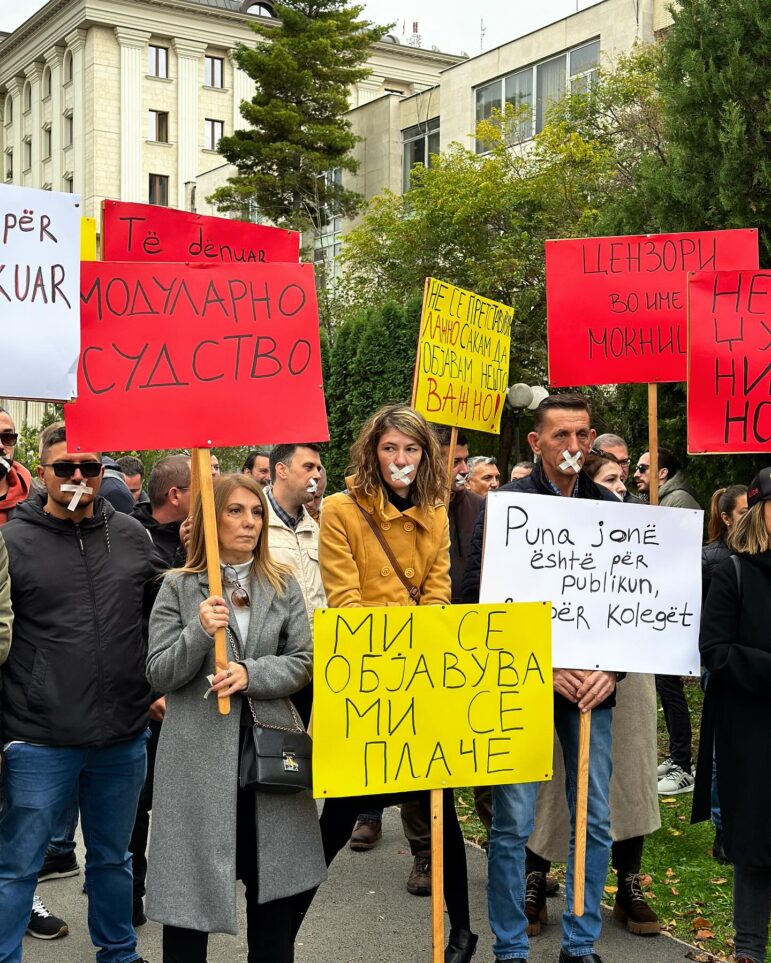
IRL staff members Maja Jovanovska and Ivanka Nasteska (center) demonstrating at a press freedom rally. Image: Courtesy of IRL
Over the course of a week, the team speaks to local people to find out what they want IRL to report on and to investigate leads, in particular relating to local corruption. In the following months, four to five stories from the mobile newsroom will be published — ideally, local investigations on topics with national relevance, such as an investigation into a local businessman and politician involved in alleged illegal construction and violence.
“It builds loyal followers,” says Cvetkovska. “The amount of quality information circulating in the media in general is so low that we can’t just fight it with fact checking, but quality really communicates.” IRL publishes, at most, one story a month. Prioritizing quality over frequency gives its stories more reach than mainstream media in the country, Cvetkovska explains.
Young Audiences
Young people are an important focus for IRL. When the newsroom launched, around 70% of its audience was aged 35-55. Industry consensus at the time was that North Macedonia’s young people did not care about societal issues. Cvetkovska took the opposite view, deciding that different models and formats for reaching younger audiences were needed. “Young people are the future and the critical driving force of the country,” she adds.
More visual products, like the newsroom’s signature documentary Murder in Tetovo, and a focus on social storytelling have helped grow a younger audience, adds Chadikovska. Whatever platform used to reach them, it’s about crafting an investigation that young people can relate too. For example, a story about financial crime might focus on financial crime in universities and its impact on students or why corruption is driving young people out of the country.
According to IRL, currently, 42% of their audience is between 25-34 years old, one-third are 35-44 and 8% are 18-24. The newsroom’s interest in young people extends to the newsroom’s internal culture: it regularly hires and trains young journalists and staff members. Having young journalists — the newsroom’s youngest member is 24 and it has seven others under 30 — and multi-disciplinary staff members, from graphic designers to cinematographers, not only helps IRL find the right tone and products to engage younger audiences, it’s part of its mission to build the next generation of journalists in North Macedonia.
“Sashka has dedicated most of her time to training new, young people with zero background knowledge, because our university of journalism is horrible [in terms of quality],” says Chadikovska. “The senior journalists at IRL don’t dismiss the ideas of younger staff just because we don’t have the experience. The intergenerational dialogue between staff at IRL makes the organization and its products special.”
IRL’s founders and senior leadership team are all women, which has created a newsroom led by empathy, says Chadikovska. “In the Balkans, the people in the media with the most decision-making power are all men,” Cvetkovska points out. “In an era of so much distrust in the media, there needs to be more empathy.”
The entire team consists of 20 people — 17 full-time and three part-time. Its team members feature heavily in its Newsroom documentary series, of which both Murder in Tetovo and Bad Blood are key parts. The aim is to show how investigations operate rather than adopting a “true crime” tone, says Chadikovska. It’s a commitment to transparency that helps build trust in a challenging media landscape and a useful way of telling a story when sources or subjects don’t want to be on film, says Cvetkovska.
Funding Challenges
The newsroom is partially funded through international donors, including USAID, the Sigrid Rausing Trust, OCCRP, the National Endowment for Democracy, and the Dutch Ministry of Foreign Affairs. The Association of Journalists in Macedonia is currently covering the costs of the nine SLAPPs (Strategic Lawsuits Against Public Participation) that IRL is fighting.
Some readers donate on a monthly basis and IRL has run crowdfunding campaigns before, but there is not a culture of reader-funded news in North Macedonia. Cvetkovska is aware that being fully grant or philanthropically funded is a problem, exemplified by the Trump administration’s controversial decision on January 25 to abruptly freeze all USAID funding for 90 days.
“In the long term, we aim to develop sustainable funding models that reduce reliance on government or international funding,” she says. “Our goal is to foster public support by engaging directly with citizens and creating revenue streams that strengthen independent journalism while countering societal polarization.”
Online Abuse
SLAPPs are not the only threats to IRL’s operations. The newsroom is repeatedly subjected to orchestrated online attacks, especially in the 12 hours after a new investigation is published.
“Usually they come from a political party or sometimes businessmen, who hire trolls and bots to attack us,” says Chadikovska. “We tried responding to all of them, even though it’s hard work. We give arguments to the people who support us and mobilize them to fight with the bots.”
This experience will shape IRL’s next product: bots in the public interest. The newsroom is planning to have its own bots or, rather, people hired by IRL who will be active on social media (it’s a particular problem on Facebook and Instagram) and in comments. This team will share fact-checked responses to attacks and misinformation and disinformation.
“If you allow people who are not neutral to set the narrative, they affect neutral people,” says Cvetkovska about the project, which will pilot soon and which she hopes can be used by other newsrooms. “We want to clarify things and to contribute to a more informed electorate.”
This project is another reminder of the “hostile environment,” as described by Dragan Sekulovski, executive director of Association of Journalists of Macedonia, in which IRL operates. “The Investigative Reporting Lab stands out for its unique investigative style and collaboration with the public broadcaster [MRTV] to reach a broader audience, courageously tackling sensitive topics often overlooked in the country’s media landscape,” he says. “Its work drives positive change and motivates institutions to take proactive steps in addressing issues of high-level corruption.”




